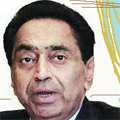
The Indian government has promptly responded on the rising inflation on Friday that has touched the 7% mark, highest in the last three years, in the week ended on March 22. In a scathing attack, the opposition has bitterly criticised the government for being unable to check the towering inflation.
Union Cabinet Ministers Kamal Nath, Sharad Pawar and Deputy Chairperson of Planning Commission Montek Singh Ahluwalia have responded separately over the issue of government’s move to curb the inflation.
All of them have tried to assure public in their own way to decline the inflation rate very soon as government had already taken some considerable steps after the last Wholesale Price Index (WPI) for the week ended on March 14 had come out on March 29, reporting that India’s Inflation rate had then touched 6.68% mark, the top mark.
According to Kamal Nath, Minister of Commerce and Industry, who was interacting to media on April 04 at the sidelines of the Incredible India at 60 conference in Singapore, “We will not hesitate to take the strictest possible measures against hoarders and profiteers…including legal provisions,".
Moving steps were taken after the report of WPI, the government has scraped import duties on edible oils and barred the export of non-basmati rice. While later in this inflation-controlling development, government has also withdrawn the incentives on export of Basmati rice.
On the rising price of cement and steel, government has directed the manufactures to follow the restrain policy but it seems to be a losing battle as manufacturing companies has hiked the prices of cement and steel.
Whereas clarifying over the issue of government’s move to pressurise the manufacturers Commerce Minister said, “The government has no intention to force these companies to reduce the prices using the provisions (section 18G) of the Industrial Development and regulation act but cement and steel industry must also ensure that we do not look at this (provision)."
Kamal Nath has probed supply side management as the biggest challenge for controlling inflation. However, he has announced that government can introduce some new export import policy to check the inflation and to support to dipping exports by providing exporters an intensive package.
Sharad Pawar, the Agricultural Minister has also expressed hope to decrease the soaring price rate very soon from government’s move. It will show its effect within 2-3 weeks, cited Pawar.
Montek Sing Ahluwalia, the Deputy Chairman of Planning Commission has also extended the same hope while Finance Secretary Subba Rao has said that the government is open to take further steps to bring inflation within tolerable limit.
According to WPI report on inflation data for the week ended March 22, the inflation rate has been increased to 7% due to surging prices in some food grains including fruits, vegetable, pulses, cereals, eggs, meat and fish as well as price hikes in some manufactured item category including sunflower oil, vanaspati, butter, mustard oil, sugar and groundnut oil. Due to price rise in iron ore, the prices also rose in mineral category from 38.2 percent to 46 percent.
On the other hand, condiments and spices in the food grains while edible oils ghee and coconut oil became cheaper in that week. Despite of rolling price in metals, the car chassis moved down by one per cent.
Leading economists and institutes are also worried about the unexpected inflation rate and some of them have expressed that it is affected from the global market as in the whole world, the inflation has been reached very high.
The Managing Director of ICICI Bank K V Kamath has assumed, “The high commodity prices and global uncertainty will not impact India much, which will continue to grow between 8-10 per cent.”
“The extent of our coupling is not as much as other countries. Ours is not an export dependent economy. Our dependence on capital inflows to grow is not very high.” he added.
Viewing the rocketing inflation rate, Reserve Bank of India can hike the CRR to maintain the liquidity in the market. “The ICICI bank would take any step only after a signal from RBI,” said Kamath.
On the other hand, the major opposition party, Bhartiya Janta Party (BJP) has condemned the government for its failure to check the rocketing prices of essential commodities, alleging that Central Government is responsible for higher inflation rate and States Governments are equally liable for the situation due to their failure in some cases to act against hoarders and black-marketers.
In West Bengal, the Trinamool Congress and its new partner SUCI have called a 12-hour Bangla Bandh on April 21 for protesting against government’s failure of not checking rising prices of essentials commodities.
“Neither the Centre nor the state government can deny responsibility for the spiralling prices”, said Mamta Banerjee, the president of Trinamool Congress.
null
|
|


Comments: